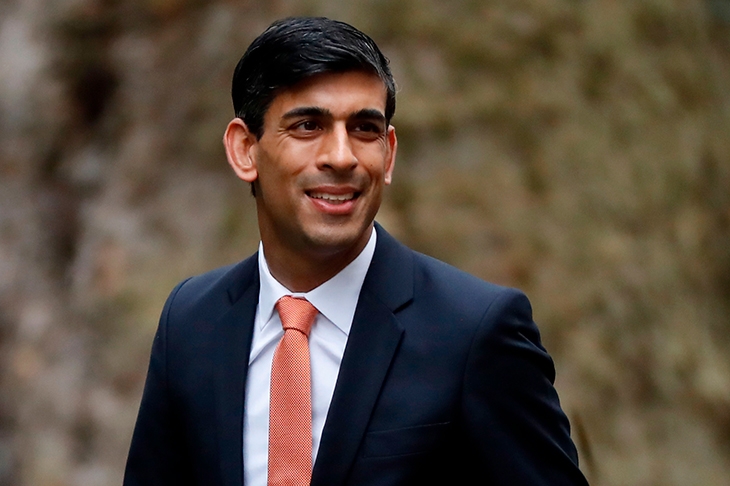Was the Chancellor wrong to guarantee only 80 per cent, rather than 100, of ‘coronavirus business interruption loans’ to keep small- to medium-sized companies afloat? Rishi Sunak’s announcement this week of fully guaranteed micro-loans for the smallest companies seeking to borrow up to £50,000 was reported as a partial climbdown in the face of pressure from the CBI and many of his own MPs to do away with the on-risk slice of the larger scheme, which provides loans of up to £5 million through 40 accredited banks — but which many would-be borrowers have claimed is a bureaucratic nightmare.
Readers certainly confirm that picture. One in the motor trade tells me he wrangled with Barclays for a month, answering endless ‘cut-and-paste questions’ before finally securing approval. Another, in construction, concluded a vivid account of his battle with Lloyds — so far most criticised for being unhelpful in administering this scheme — with a swipe at ‘a bunch of jobsworths who owe their own survival to a government bailout back in 2008’. Only NatWest, majority-owned by taxpayers through its parent RBS, has earned praise for doing what I advised all banks to do last month, which was to ‘cut the crap and act fast for the general good’.
In asking banks to participate in the loan scheme’s risks, there was always a danger they would interpret its rules to suit themselves, add their own conditions and favour their own customers. On the other hand, it interposed a real loan assessment process rather than simply inviting companies to queue for maximum giveaways; it’s backed by a range of other emergency reliefs and subsidies; and it ties the banks into the ‘pain-spreading’ principle I described in previous columns as the best path to ‘herd survival’. I think Sunak is right to stick to his guns.
Texas flash crash
‘Oil at minus $38 a barrel’ was a headline that suggested the economic world really was imploding. For a few minutes on 20 April, that was the price applicable to the May futures contract for the ‘West Texas Intermediate’ grade of crude oil. The problem, we’re told, was that no trader anywhere wanted to take physical delivery of the black stuff behind the contracts when they expired this week, storage facilities in Texas and Oklahoma being already full to the brim. But the plunge was so extreme that many observers suspected a rogue algorithm or an evil hand — just as the ‘flash crash’ which caused the Dow Jones share index to lose 1,000 points in half an hour on 6 May 2010 was pinned by US investigators on Navinder Singh Sarao, a futures trader operating solo from his back bedroom in Hounslow.
Locked-down thriller writers no doubt warmed to the idea of Chinese agents pushing oil off the precipice to amplify the disruption of the West already launched so effectively by their colleagues in a Wuhan laboratory. But the collateral damage turns out to be in the opposite direction: some 60,000 Chinese retail investors who had bought Yuan You Bao (‘Crude Oil Treasure’), an oil-linked savings product marketed by Bank of China, have ended up losing more than $1 billion between them. There’s globalisation for you. Meanwhile, with industrial and transport demand at undreamed-of lows, the ‘real’ price of oil hovers around $15 a barrel, down from $70 in January — and the industry needs no conspiracy theories to see more mayhem coming.
Speculative rockets
Many thanks to readers who emailed ideas for the ‘pandemic recovery portfolio’ that veteran investor Robin Andrews and I have been busy assembling. This week we’ve scanned the bioscience sector, where the challenge is to differentiate potential long-term winners from ‘Covid-related’ speculative rockets — some of which have been performing like late-1990s dotcoms, or the spuriously ‘Aids-related’ stocks (including breweries and cinemas, as supposed distractions from casual sex) which I used to watch lighting up the 1980s Tokyo stock market. Bandwagons it’s probably too late to jump on today include diagnostics research ventures such as Novacyt and Omega, and Synairgen in respiratory drug discovery, all of which have seen their prices multiply. One of the best performers in our 2019 ‘optimist portfolio’, Avacta, has also risen sixfold on news of involvement in developing a rapid virus infection test — so if you followed us on that one, you’re quids-in. But now might not be the moment to buy more.
On the other hand, we think two of our other ‘optimist’ picks still offer interesting value: ReNeuron, in stem cell research, and Angle in blood analysis. And two more non-Covid plays we’re adding to our recovery list are Shield Therapeutics, which makes a product to compensate for iron deficiency, and Arix, an investment vehicle with holdings in 17 healthcare ventures and a large discount to their underlying values in its current share price.
That’s enough unfamiliar names for this week and as ever you should do your own research; but it’s gratifying to hear from readers who have done well on some of our previous suggestions — and we welcome more of yours, to martin@spectator.co.uk.
Fresh air ahead
One volatile US stock that would have been worth a lockdown punt is Peloton, the New York-based hi-tech exercise bike brand which I wrote about in December after it shed $1.3 billion of market value in response to an allegedly sexist ‘Peloton Wife’ television ad. The shares have recently doubled on news that sales of its static sweat machines had passed two million, while no less than 23,000 indoor users logged on to a single virtual exercise class. But beware: delivery time for a new bike is now seven weeks, by which time — let’s hope — fresh air will be fashionable again and the fitness fanatics’ stock to watch (currently 15 per cent below its February level) is more likely to be Nike Inc, the running-shoe maker.







Comments